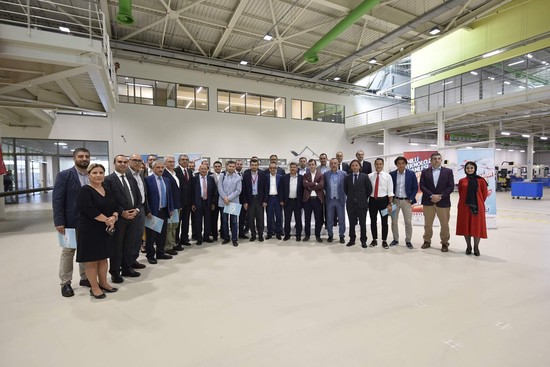Selçuk Bayraktar, Chief Technology Officer of Baykar, which develops and produces unmanned aerial vehicle systems, said that the company will release unmanned combat aircraft before 2023 and unmanned aerial vehicles capable of carrying 1.5 tons of load and conducting more strategic tasks in 2019.

Baykar CTO Selçuk Bayraktar (front row, 10th from right) speaks to senior executives and members of the press at Baykar's headquarters in Istanbul on Sept. 10, 2018. (DHA Photo)
The national unmanned aerial vehicles (UAV) and armed unmanned aerial vehicles developed by the Turkish defense industry are contributing greatly to the security forces. Turkey has become one of the most active countries that control the airspace with unmanned aerial vehicles and armed unmanned aerial vehicles that have been included in the inventory in recent years.Thanks to UAVs and armed UAVs that can compete with developed countries in tactical and operative class, the Turkish Armed Forces (TSK) is destroying terror targets it sets. Baykar Machinery Technical Manager Selçuk Bayraktar gave the good news at Baykar's headquarters, saying, "Hopefully, we will fly unmanned combat aircraft before 2023 and unmanned aerial vehicles capable of carrying 1.5 tons of load and conducting more strategic tasks in 2019."
Stressing that Turkey has begun selling armed UAVs, Bayraktar stated that they sold mini versions of them in 2012 and are now selling bigger ones to three-four countries including Qatar and Ukraine.
Indicating that UAVs have contributed greatly to the decline of terrorist incidents in the last two years, Bayraktar noted that foreign countries provided neither UAVs nor their ammunition as they did not want the terror to end.
According to Bayraktar, terrorist incidents have considerably declined in the last two years as UAVs, 58 of which were developed by Bayraktar, are being used quite effectively. Bayraktar also said that 15 of them are in the sky currently, adding that they will gradually rise to 50.
Bayraktar further expressed that they provide relevant training after the delivery of unmanned aerial vehicles, continuing that he spent three years with teams in the southeast. Recalling that unmanned aerial vehicles were equipped with special technologies during the Afrin operation, Bayraktar said that Bayraktar TB1 is the best of the world in its class. "There is no other country which conducts counterterrorism operations as many as Turkey and uses so much technology," Bayraktar said.
Bayraktar also touched on the contribution to the Turkish economy with the stop of unmanned aerial vehicle imports as a result of Baykar's production, saying, "It would not be measured with money; if it were, it would add up to billions of dollars."
Highlighting that Baykar works like an academic institution in itself, Bayraktar said, "From high school years onwards, our core team has grown up with us, not working somewhere else. We train them from among ourselves."